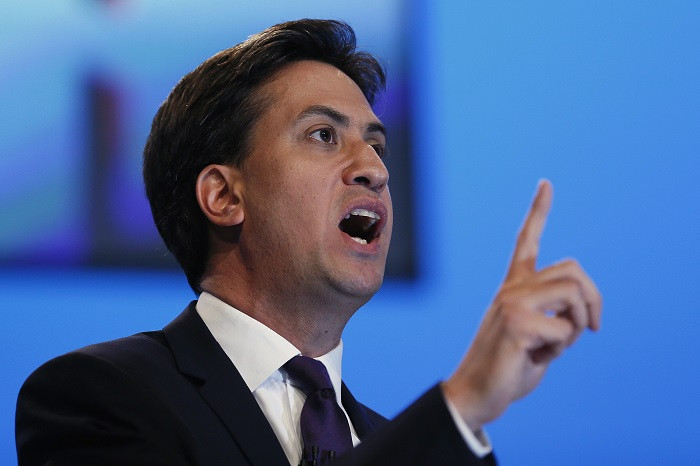Ed Miliband Rules out Early EU Referendum - but Leaves Door Open

After months of speculation and internal Labour wrangling Ed Miliband has taken a huge risk by finally ruling out an in-out referendum on Britain's membership of the EU.
But his apparent decisiveness was undermined by the fact that he left the door slightly ajar to a vote if there were ever plans to transfer further powers from London to Brussels - something that no one can imagine in the foreseeable future.
So his attempt to walk a very fine tightrope between the potential distractions of a damaging and divisive battle over "in or out" while satisfying voters demanding a say on the issue can all too easily be portrayed as a fudge rather than a clear decision.
That danger was evident in competing newspaper headlines, "Miliband rules out early EU poll" (Financial Times) or "Ed: we will give EU an in-out vote" (Mirror).
And there was the inevitable response from the Tories that they are now the only party promising British people a say, with the planned referendum in 2017.
It also strengthened the Tories' claim that voting for Ukip as a way of taking the UK out of the EU would backfire because it would only let in Labour which has ruled out a referendum.
The British people know, given the history of the EU, as well as uncertainty about precisely what an integrating Eurozone might involve, that it remains possible and they need a guarantee.
But Miliband's gamble was that the flak he would take for his compromise would be far less damaging than the consequences of matching the Tory referendum pledge and ensuring the next four years were dominated by arguments over Europe.
And he pointed to the running battle over Europe that continued to batter Cameron's leadership and force him into constantly offering concessions to his backbench rebels who, in many cases, will never be satisfied with anything less that withdrawal.
Miliband said: "The next Labour government will legislate for a new lock. Not simply a referendum on any treaty change proposing a transfer of power. But a lock that guarantees that there will be no transfer of powers without an in/out referendum.
"From what I have said about proposals coming from the EU for such a transfer of powers, I believe it is unlikely this lock will be used in the next Parliament.
"But the British people know, given the history of the EU, as well as uncertainty about precisely what an integrating eurozone might involve, that it remains possible and they need a guarantee."
He also stressed the need for far-reaching reforms of the EU over key issues such as benefits tourism and cheap labour.
So no vote next parliament if Labour wins - probably, but a vote if at any time in the future there is another power grab by Brussels.
One of the reasons Miliband has taken his current approach is the need to reach a compromise between two opposing factions in his own party – those led by the likes of Ed Balls who favoured a referendum pledge and those including shadow minister Douglas Alexander who feared such a pledge would be a damaging, long-running distraction.
But Miliband also wants to satisfy two different audiences in the country. The business community and the City are virtually unanimous in their opposition to withdrawal from the EU, and anything that might make that possible, while foreign investors like the car giants have warned they might leave the UK under such circumstances.
The CBI said: "The CBI strongly supports Ed Miliband's view that we are better off in a reformed EU than outside with no influence."
On the other hand, there is a widespread desire amongst voters for a say over the issue, as evidenced by support for Ukip and the fact that Tory backbenchers were able to hold Cameron hostage on the issue.
Another consequence for Miliband might be loss of support from donors such as businessman John Mills who said the influence of the EU over Britain meant an in-out vote was necessary "regardless of future events".
Miliband will be hoping that his gamble pays off and that membership of the EU does not become a defining general election issue putting him constantly on the back foot answering questions of why he does not trust voters with a referendum.
© Copyright IBTimes 2025. All rights reserved.






















